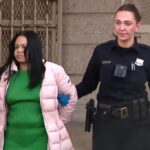After more than three months since the apparent assassination attempt on former President Donald Trump, Pennsylvania county officials have finally released 911 recordings from the July 13 rally. The Intercept filed a lawsuit in September to obtain the recordings, which Butler County had refused to provide without a court order.
According to the recordings, calls began pouring into Butler County emergency services one minute after shots were fired at the Butler Farm Show grounds. Callers expressed fear, terror, and confusion in the chaotic aftermath. Relatives of rally attendees called in alarm, worried about their loved ones.
Despite authorities having identified the shooter as a suspicious person at least 25 minutes before the shooting, 911 operators reassured callers that law enforcement was aware of and handling the situation.
One caller reported, “Gunshot at the Trump rally,” to the Butler County 911 operator in one of the 15 audio files of 911 calls released to The Intercept. The operator assured the caller that police were on their way. In another call, a different caller was told that the situation was under control.
Names and phone numbers of callers were redacted from the recordings.
Several calls captured people screaming in the background, intensifying the sense of chaos as attendees awaited police response. One woman reported, “We are at the Trump assembly and there’s a guy shooting. He’s been shooting up the place.” The operator assured her that the police were aware and handling the situation, even though no one was injured.
In another call, a woman whose husband was shot at the rally sought information on which hospital he was taken to for treatment. The operator couldn’t provide details at the time but promised to call her back once information was available.
Corey Comperatore, a 50-year-old firefighter, was fatally shot at the rally. Two others, 57-year-old David Dutch and 74-year-old James Copenhaver, were injured.
Another caller inquired about her mother, who was present at the rally. The operator assured her that police were handling the situation and would evacuate people from the vicinity of the shooting.
A man called for a paramedic to assist a woman who fainted after law enforcement began evacuating the grounds. He emphasized, “They just tried to kill President Trump,” urging the importance of noting this.
Following the shooting, The Intercept requested copies of recorded 911 calls during the rally under Pennsylvania’s Right-to-Know Law. Multiple news outlets, including Scripps News and NBC News, also requested the same materials and filed lawsuits against the county when their requests were denied.
Butler County refused the requests, citing exemptions in the public records statute that generally protect 911 recordings. They claimed that releasing the calls could compromise ongoing investigations, overlooking the provision that allows disclosure if the public interest outweighs the need for secrecy.
In contrast, Butler Township police released body camera footage showing their immediate response to the shooter from various viewpoints. The footage revealed police blaming the Secret Service for the lack of security where the shooter was apprehended. One sergeant was heard ensuring the safety of family members at the rally.
In August, the state Office of Open Records acknowledged the significant public interest in the 911 tapes but respected Butler County’s decision to withhold them.
On Wednesday, Judge Kelley T. D. Streib of the Butler County Court of Common Pleas issued a consent order favoring the release of the recordings under Pennsylvania law, considering the unique historical circumstances.
David Bralow, The Intercept’s general counsel, emphasized the importance of government transparency, stating, “The release of public records should be a top priority of government, not a reluctant one that happens only after the threat of litigation.”
Please rewrite this sentence.
Source link




